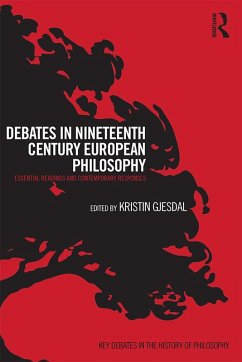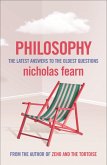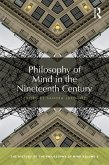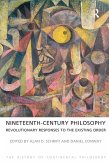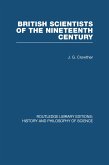Debates in Nineteenth-Century European Philosophy offers an engaging and in-depth introduction to the philosophical questions raised by this rich and far reaching period in the history of philosophy. Throughout thirty chapters (organized into fifteen sections), the volume surveys the intellectual contributions of European philosophy in the nineteenth century, but it also engages the on-going debates about how these contributions can and should be understood. As such, the volume provides both an overview of nineteenth-century European philosophy and an introduction to contemporary scholarship in this field. KEY DEBATES IN EUROPEAN NINETEENTH-CENTURY PHILOSOPHYKristin Gjesdal (ed.)ContributorsEditor's IntroductionI. Kantian Presuppositions1. The Reception of the Critique of Pure Reason in German Idealismby Rolf-Peter Horstmann2. The Reception of the Critique of Pure Reason in German Idealism: A Response to Rolf-Peter Horstmannby Paul Guyera II. Fichte (1762-1814)3. Fichte's Original Insightby Dieter Henrich4. Fichte's Original Insight: Dieter Henrich's Pioneering Piece Half A Century Laterby Gnter Zllera III. Romanticism 5. Philosophical Foundations of Early Romanticismby Manfred Frank6. Response to Manfred Frank, "e;Philosophical Foundations of Early Romanticism"e;by Michael N. Forstera IV. Hegel (1770-1831)7. From Desire to Recognition: Hegel's Account of Human Socialityby Axel Honneth8. On Honneth's Interpretation of Hegel's "e;Phenomenology of Self-Consciousness"e;by Robert B. Pippina a a a V. Schelling (1775-1854)9. The Nature of Subjectivity: The Critical and Systematic Function of Schelling's Philosophy of Nature by Dieter Sturma10. Nature as Unconditioned? The Critical and Systematic Function of Schelling's Early Worksby Dalia Nassara VI. Schopenhauer (1788-1860)11. The Real Essence of Human Beings: Schopenhauer and the Unconscious Will by Christopher Janaway12. Emancipation from the Willby David E. Wellberya VII. Comte (1798-1857)13. Auguste Comte and Modern Epistemologyby Johan Heilbron14. Why Was Comte an Epistemologist?by Robert C. Scharffa VIII. Mill (1806-1873)15. Mill: The Principle of Libertyby John Rawls16. John Rawls on Mill's Principle of Libertyby John Skorupskia IX. Darwin (1809-1882)17. Darwin's Theory of Natural Selection and its Moral Purposeby Robert J. Richards18. Response to Richardsby Gabriel Finkelsteina X. Kierkegaard (1813-1855)19. Kierkegaard's On Authority and Revelationby Stanley Cavell20. A Nice Arrangement of Epigrams: Stanley Cavell on Sren Kierkegaardby Stephen Mulhalla XI. Marx (1818-1883)21. Marx's Metacritique of Hegel: Synthesis Through Social Labor by Jrgen Habermas22. Epistemology and Self-Reflection in the Young Marxby Espen Hammera XII. Dilthey (1833-1911)23. Wilhelm Dilthey after 150 Years (Between Romanticism and Positivism)by Hans-Georg Gadamer24. Gadamer on Diltheyby Frederick C. Beisera XIII. Nietzsche (1844-1900)25. Nietzsche's Minimalist Moral Psychologyby Bernard Williams26. Naturalism, Minimalism, and the Scope of Nietzsche's Philosophical Psychologyby Paul Katsafanasa XIV. Freud (1856-1939)27. Bad Faith and Falsehoodby Jean-Paul Sartre28. Freudby Sebastian Gardnera XV. Twentieth-Century Developments29. Analytic and Conversational Philosophyby Richard Rorty30. Not Knowing What the Right Hand is Doing: Rorty's "e;Ambidextrous"e; Analytic Redescription of Nineteenth-Century Hegelian Philosophyby Paul Reddinga References for Republished TextsAccompanying Original Works (Suggested Reading)
Dieser Download kann aus rechtlichen Gründen nur mit Rechnungsadresse in A, B, BG, CY, CZ, D, DK, EW, E, FIN, F, GR, HR, H, IRL, I, LT, L, LR, M, NL, PL, P, R, S, SLO, SK ausgeliefert werden.
"This is a superb volume with outstanding contributions by the very top scholars of German Idealism and nineteenth century philosophy. The inclusion of three generations of scholars in this collection makes it a truly admirable achievement and asset."
Yitzhak Y. Melamed, Johns Hopkins University, USA
'Should philosophy be systematic or should it be focused on discrete puzzles? Historical or argumentative? Continental or analytic? This volume shows compellingly that in every case the answer is "both."'
Richard Eldridge, Swarthmore College, USA
'This highly recommended volume is original in its conception and impressive in its execution. The pairing of classical interpretations with reactions by top current philosophers is excellently done. Specialists and students alike will benefit from this outstanding collection of seminal discussions of leading figures from Kant through Freud.'
Karl P. Ameriks, University of Notre Dame, USA
Yitzhak Y. Melamed, Johns Hopkins University, USA
'Should philosophy be systematic or should it be focused on discrete puzzles? Historical or argumentative? Continental or analytic? This volume shows compellingly that in every case the answer is "both."'
Richard Eldridge, Swarthmore College, USA
'This highly recommended volume is original in its conception and impressive in its execution. The pairing of classical interpretations with reactions by top current philosophers is excellently done. Specialists and students alike will benefit from this outstanding collection of seminal discussions of leading figures from Kant through Freud.'
Karl P. Ameriks, University of Notre Dame, USA

